The Founding of St Michael's
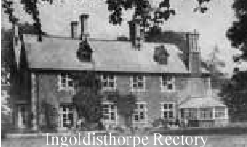
The train from Liverpool Street ploughs slowly out of London towards Cambridge and beyond, across the flat expanse of fenland to Kings Lynn and the Wash; on past the royal waiting rooms of Wolferton, up the Norfolk coast to Heacham, a few miles from Hunstanton.
The small town—or large village—Heacham stands on the edge of some of the best agricultural land in the country, its rural life subsidised by a flourishing summer holiday trade and by the proximity of the Sandringham estate. It has a fine old church which, over the centuries, was enriched by the Neville-RoIfe family who used to occupy Heacham hall. It is with the enterprise of its vicar that this article has mainly to do. The Reverend Roger Pott is a man of many parts—vicar of Heacham, rector of Ingoldisthorpe three miles away, and headmaster of school of 150 pupils.
The school is at Ingoldisthorpe, in a vast old rectory which no incumbent of to-day could ever hope to maintain as a private house. The nucleus of the staff since the venture started has been Mr. Pott, his curate, and such other members of the local clergy as have had the qualifications and inclinations to supplement their stipends with this work. To these have been added a couple of graduate
schoolmasters and four women teachers, P.N.E.U. trained at Ambleside. The school has grown to its present size with classes varying from about 15 for the under 11s to about 22 or 23 for the seniors.
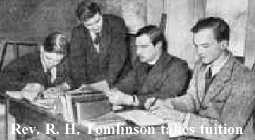
To start a new school these days is formidable business. Before the doors were opened in 1946 several battles had to be fought with the Ministry of Education and the Ministry of Works. Private enterprise in education is always suspect— sometimes for good reason—but few would-be headmasters can have had the favourable background experience which Mr. Pott took with him to Heacham.
Early in his career he began to combine full-time
school mastering with full-time service in the ministry of the Church of England. In 1935 was appointed chaplain to the presiding bishop in Japan. Among his tasks in Yokohama was the supervision of the English-speaking Church. This brought him in touch with the many different nationalities in that cosmopolitan city, and in the course of time he found himself with the additional job of headmaster of the international school. In this capacity he acquired unusual insight into the needs of children whose education had been complicated by language barriers, and by living abroad. A score of nationalities were to be found in the school. Candidates were prepared for School Certificate examinations in nine languages. Mr. Pott doubled these duties with those of an ordained minister of a missionary church. As will be shown later, much of this experience is proving invaluable in the very different circumstances of north Norfolk.
Shortly after being demobilized from the Royal Navy—in which as a chaplain he survived shipwreck more than once—he was appointed vicar of Heacham. Following a long and admirable tradition among English country parsons, he planned to eke out his derisory stipend by taking a few boys for coaching. His idea was to help those who were slow at learning, or whose education had been interrupted by illness or some other cause, and who had slipped too far behind to pass Common Entrance. He began with six. To his surprise, as soon as it became known that he was taking pupils, he was inundated with requests from frenzied parents. It became clear that there was a keen demand in the neighbourhood for a new school, and that to many he appeared to be the answer to their educational needs.
He adopted a principle which he still retains. He was not there to coach educationally sub-normal or maladjusted children; he did not profess to have studied them. He intended to offer something to the children who had fallen behind for some reason, but who, with patience and individual care, could go as far on the academic road as many others who at 11 or 12 looked infinitely brighter. His contempt for the 11 plus examination was unbounded. He did not believe that it was fair, nor would he do so, however much the techniques were improved, until it was conducted anonymously by an independent examining body.
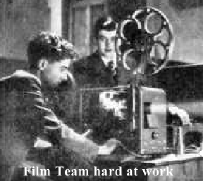
Since 1946 he has had ample opportunity to test to his own satisfaction
the validity of the secondary selection tests. His 11 plus rejects have included boys now plainly destined for the universities. In some cases they were boys who had been held back by illness, or by frequent changes of school, or by interruptions caused by foreign travel. Most of them follow the pattern of the typical late-developer, who continues to the age of 15 or 16 to show little or no promise until in his certificate year or just before he suddenly begins to make a rapid improvement. Some boys are sent by local authorities. These include the usual proportion from broken homes and others whose parents are abroad. If necessary, Mr. Pott makes arrangements for them during the holidays as well as in term.
It would need the pen of Trollope to do justice to the steps which led to the transformation of Mr. Pott's private tutorial venture into a fair-sized school. The parish of Ingoldisthorpe had been without a vicar for
some time. Who could be found to take it on with its enormous rectory? There were consultations with rural deans and suggestions from archdeacons. The Bishop of Norwich expressed his views, Mr. Pott had suggested that someone should be appointed who could use the rectory as a school and combine pastoral work with teaching. The upshot was that Mr. Pott himself was invited to undertake those duties. For this purpose he was to hold two parishes, which are nowhere adjacent, in plurality, and to have a curate to help him.
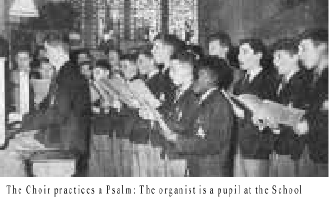
St. Michael's School opened with 70 pupils, aged five to 14, selected from 120 applicants. There were 11 boarders. Two of the neighbouring clergy came to help, the Rev. J. E. M. Ashworth, now Dean of Trinidad, and the Rev. R. Tatlock, now on the staff of the director of religious broad- casting. This connection still goes on: the Rev. R. H. Tomlinson, the local rural dean and vicar of Brancaster, drives to Ingoldisthorpe three days a week to teach classics.
What made the school possible in its present form was the generosity of an elderly American lady. She made the school a present of her large house at Heacham, which is now the main boarding house, and there was also an anonymous gift of £5,000 which provided the necessary initial capital. Beyond that the school has to be entirely self-supporting, for while the diocesan authorities approve of the experiment and are happy to see the rectory put to this use, they have not felt able to take it over as a church responsibility, As everywhere, the fees have gone up, but they are varied to the means of the parent and the needs of the child.
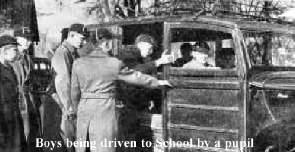
As the boys' boarding house, for 50 boarders, is three miles away from the school, transport is costly and difficult to organize. A double-decker bus is being acquired by the school, which will go a long way to help. There are also several school cars and a shooting brake. All boys start driving lessons as soon as they turn 17 and not only does this give everyone, including the non-academic, the chance of passing an examination, it also makes a contribution to the scattered communications of the neighbourhood. A visitor to the school is likely to receive a note from the headmaster to say that " a prefect will meet you at the station with a car." This is part bravado, part wise improvisation. There are about 35 girls at the school, 12 of them boarders in a house at Ingoldisthorpe.
The religious element fits naturally into the pattern of the school. Each morning starts with chapel in the parish church. One of Mr. Pott's ambitions, which he hopes to be realized in a few years, is to see some boys from St. Michael's offering themselves for ordination. The school gives what has been described as " a good grammar school course of an old-fashioned type," which means that it is strong in classics and weak in science, but not mathematics.
There is science to the ordinary level of the General Certificate of Education. Everyone learns French and Latin, and those who can, Greek. The choir is 50 strong, 40 of whom also sing in Heacham church choir on Sundays. They play games daily, and run cricket and football teams which are surprisingly strong in view of the wide age-range. George Brown, the old Hampshire player, has worked wonders with the cricket, and his greatest hopes are now
centered on this year's captain, a Persian boy, who had never held a bat until he came to the school several years ago. The overseas contingent includes five Persians, two Armenians, one boy from Kuwait, one from Jordan and one from Gambia.
So far the sixth form is only in its infancy, two boys working for the "A" level certificate in French, history and economics, one of whom, an 11 plus reject, is a potential county award winner. Next year there will probably be about 12, and mathematics and Latin will be among the subjects. The record in examinations has not so far been unsatisfactory: in the last year of the old School Certificate, three out of four candidates were successful. A similar percentage have gained General Certificates each year since, and the number of candidates has risen steeply. The certificates themselves, at St. Michael's as everywhere else, have varied in quality, but last year there were those boys who passed in eight and nine subjects as well as the weaker brethren with their twos and threes. This summer there are 40 entrants, most of whom will be offering seven or more subjects; while others are offering 11, including three languages, and there is reason to hope for still better things from those
coming on.
Queen Mary, in her last years at Sandringham, showed a keen interest in the school and paid regular
and penetrating visits to see what went on. In their turn, also, H.M.I.s have inspected the school, but while not disparaging the teaching they have advised the Minister to withhold recognition for technical reasons
which it would not be proper to discuss here. It is enough to say that the standard of education given, and the working conditions are far and away better than those in some local authority schools.
The " Ingoldisthorpe experiment," to give it a label, is a challenging example of what could be done with some of the church property which encumbers many parishes. It is also in the best tradition of independent education, doing what the State system cannot do, refusing to allow the exception to be crushed by the rule, and all this against a background of Christian doctrine and practice.
![]()